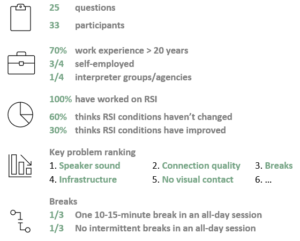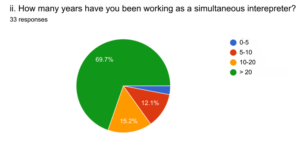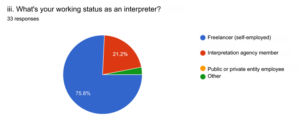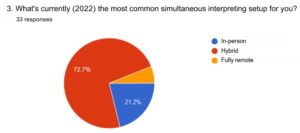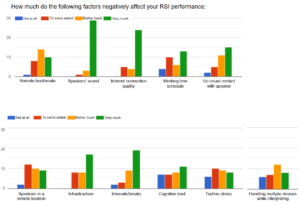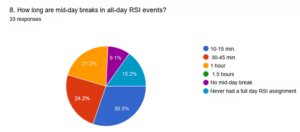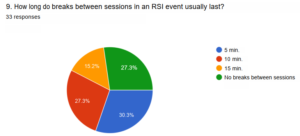REMOTE SIMULTANEOUS INTERPRETING 2 YEARS IN SINCE THE COVID-19 PANDEMIC
Athens, 7 December 2022
In April-May 2022 SYDISE conducted a questionnaire-based survey among its members to map the conditions of remote simultaneous interpretation (RSI) in the two years since the beginning of the coronavirus pandemic.
THE SURVEY AT A GLANCE
PURPOSE
The aim of this survey was to (a) map the current RSI contexts, environments, and practices in Greece, (b) explore the potential for improving RSI assignment conditions with regard to safeguarding the health of professional conference interpreters and to sustaining the high quality of the services provided, and (c) draft and promote good practices for all stakeholders (conference organizers, technical companies, interpreters, audiences)
SUMMARY FINDINGS
The sample comprised 40% of all SYDISE members. Most respondents (70%) have extensive working experience of over 20 years
All respondents have provided RSI professional services within the last 2 years (2020-2022); the majority stated that they are aware of the recommended specifications for RSI work.
Almost 6 out of 10 respondents think that RSI conditions—which they generally find problematic—have not changed during the two years of the pandemic. Almost 1 out of 3 consider that conditions have slightly improved, while only 1 out of 10 replied that RSI conditions have clearly improved; 15% of the respondents feel that conditions have deteriorated
At the time of the survey, a transition to post-Covid conditions was already evident in the Greek market; in May 2022, 3 out of 4 interpreters were already working in hybrid events, although only 1 out of 5 were required to be physically present at the event venue. Most stated that they usually worked from home or from hubs (8 out of 10), while only 1 out of 5 provided interpretation in hybrid settings from the event venue
The respondents ranked the following factors as negatively affecting their RSI performance: speakers’ sound, internet connection quality, intervals/breaks between sessions, infrastructure, absence of visual contact with the speaker and/or their colleague(s), working time schedule, cognitive load, colleague(s) and speakers being at a remote location, and handling multiple devices while interpreting.
Regarding scheduled breaks in RSI assignments, 1 out of 4 interpreters replied that the main break in an all-day RSI session is usually 30-45 minutes long; 1 out of 5 stated that the main break lasts 1 hour; 1 out of 3 said that the main break lasts only 10-15 minutes and 1 out of 10 stated that there is no main break in a full-time (7-hour) assignment.
As regards the intermittent breaks between sessions in an all-day conference, 1 out of 3 indicated that these breaks last only 5 minutes; 1 out of 3 stated that they last 10 minutes, and 1 out of 3 stated that there is no break at all between sessions in an all-day (7-hour) assignment.
With regard to the speakers’ sound quality, most interpreters said that poor quality primarily results from problems linked with the speakers, more than 50% said that the problems are linked with the organizers, and 1 out of 3 said that the problems are linked with the technical company.
As far as engagement agreements are concerned, most respondents (7 out of 10) incorporate RSI specification clauses in their contracts, considering this to be an essential safeguard for the services they provide
Most respondents stated that they inform the parties involved in an online meeting about RSI requirements by contacting the organizer and many said that they contact the client and/or the technical company directly or include relevant reference in their employment contract. The majority (7 out of 10) believe that if SYDISE communicated recommendations to technical companies, these would help in raising awareness about the interpreters’ work requirements in RSI conditions.
Other issues that respondents considered critical when working in RSI conditions:
- Managing transition from remote to hybrid or physical conference settings
- Customer VS interpreters’ requirements (breaks, pre- and post-Covid fees)
- Use of microphone by speakers
- Ways to charge services in hybrid formats
- Notification when interpretation is recorded and/or streamed
- Adequate breaks between sessions
- Educate participants about interpretation (by client/organizer)
- Interpreters should not work alone, regardless of the length of the event
- Streamline working conditions in Greece with those in other countries
- Disinfection/cleaning in hub areas
- RSI and consecutive interpretation
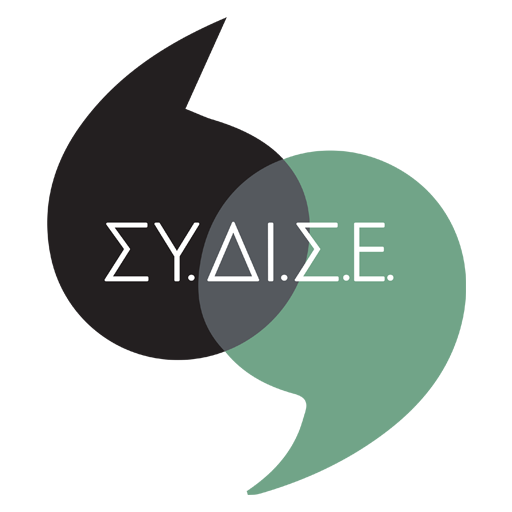

![The remote simultaneous interpreting setting in Greece – a brief survey [May 2022]](https://www.sydise.gr/wp-content/uploads/2015/02/1crop.jpg)
